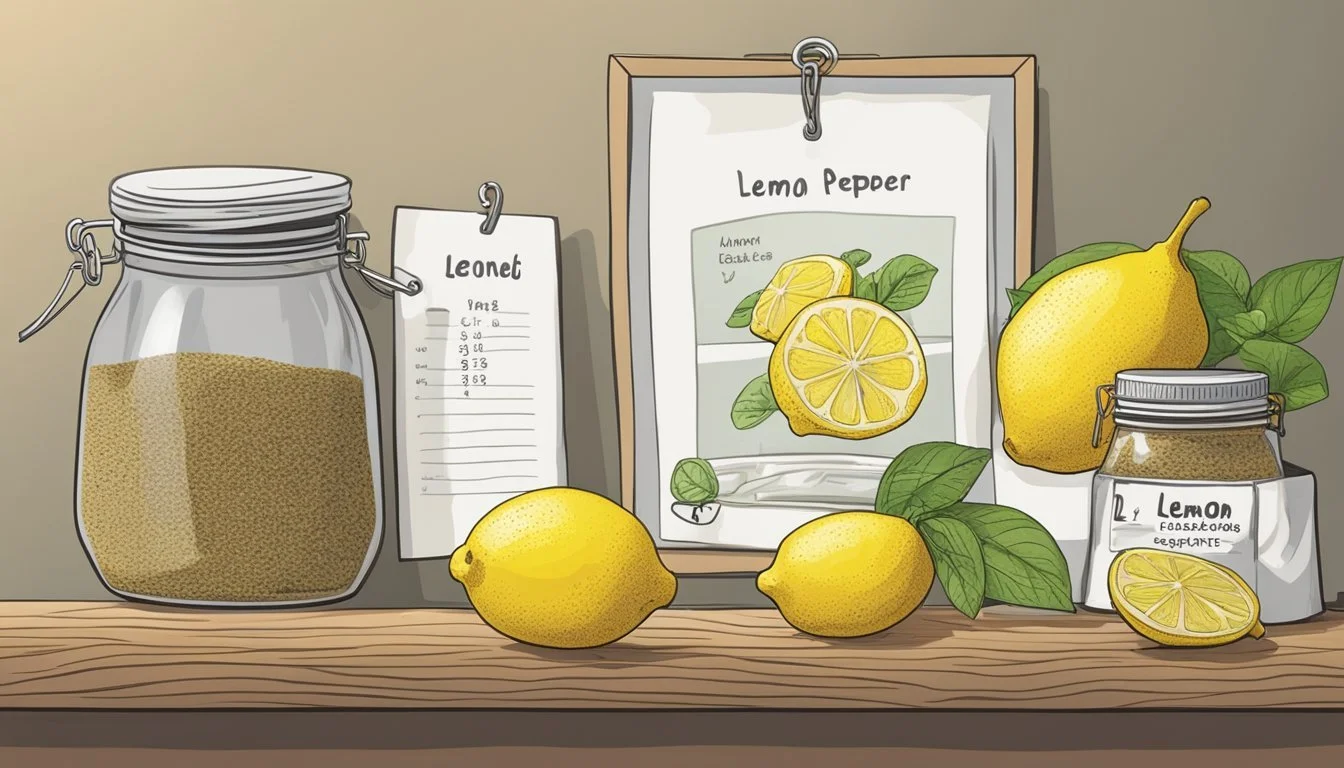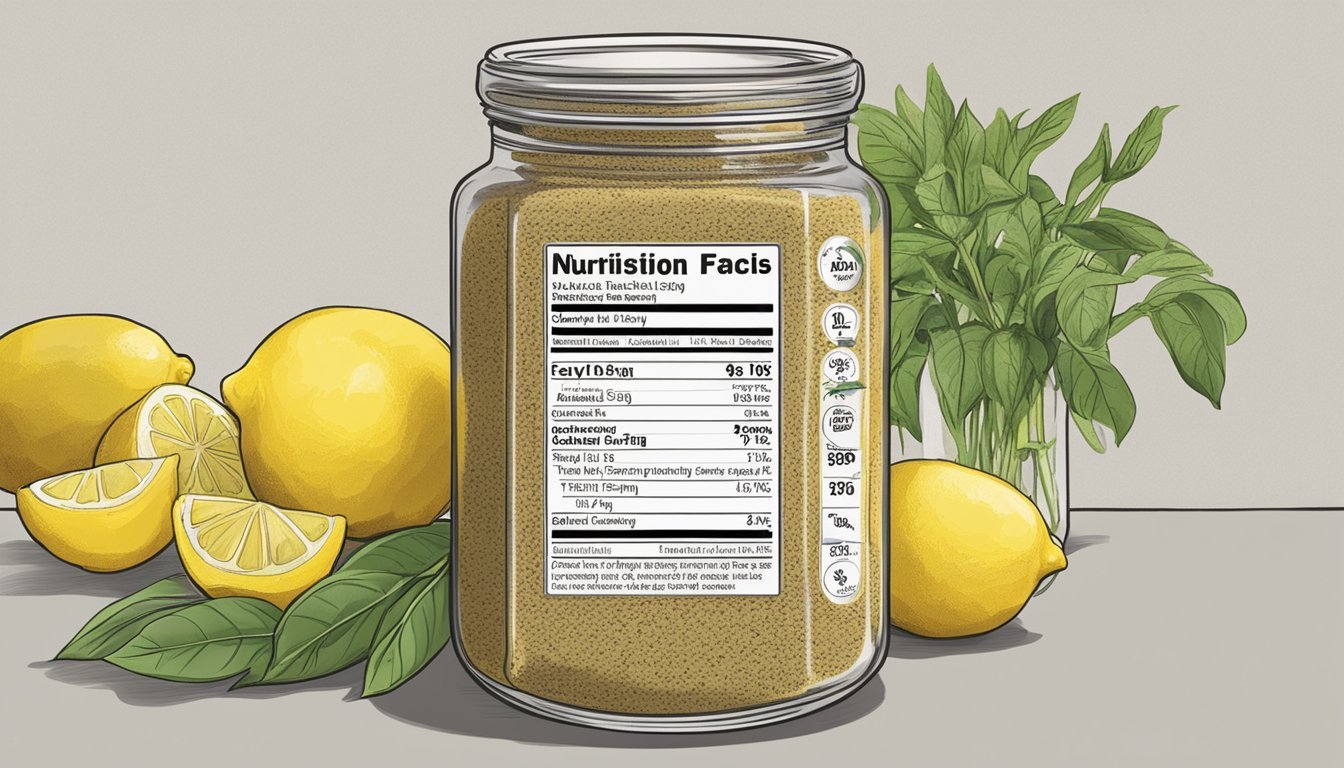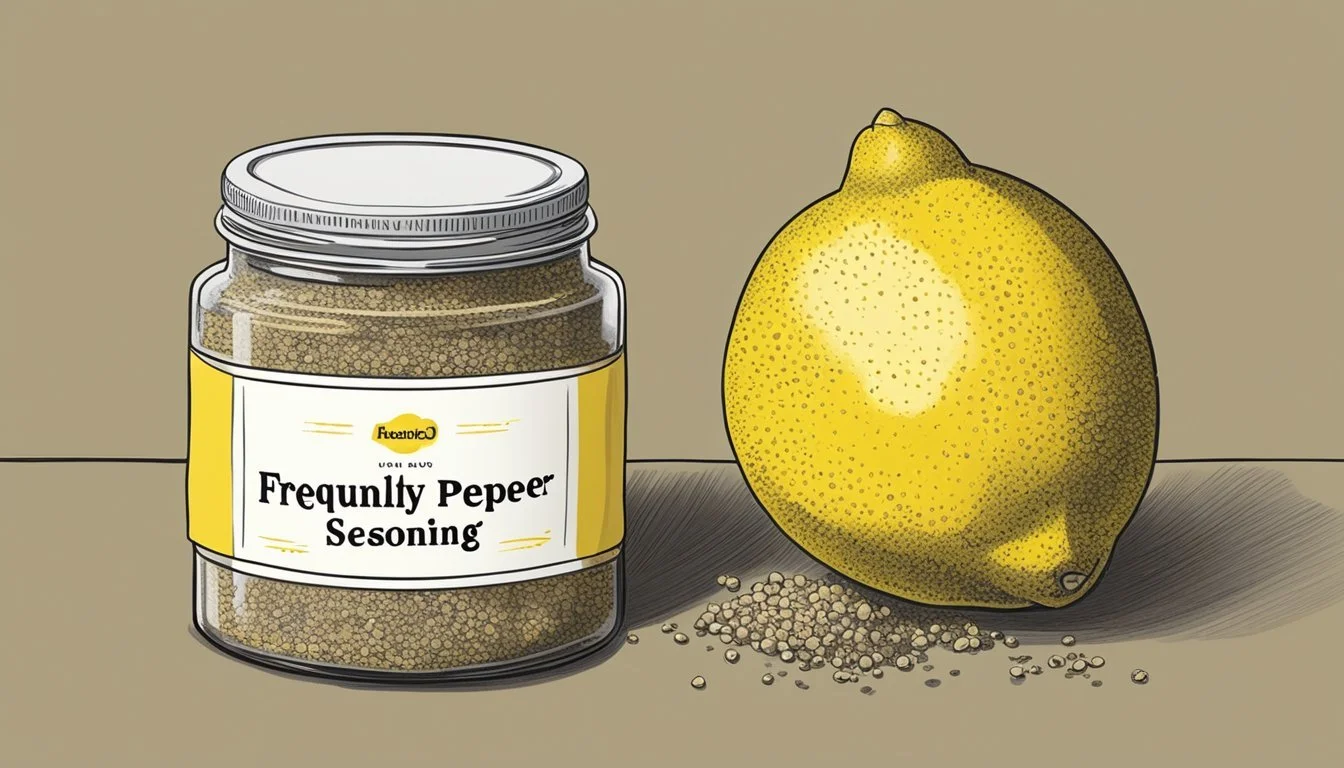How Long Does Lemon Pepper Seasoning Last?
Unveiling Shelf Life Secrets
Lemon pepper seasoning (how long does lemon pepper seasoning last?), a staple in many kitchens, is beloved for its zesty and bold flavor that can enhance a variety of dishes. The blend typically combines the tanginess of dried lemon zest (how long does lemon zest last?) with the sharp bite of black pepper, rounded off with salt and sometimes additional herbs or spices. Its versatility in culinary applications has made it a go-to spice for everything from seafood to poultry, and even vegetable dishes.
Understanding the shelf life of lemon pepper seasoning is crucial for maintaining its potent flavor and ensuring food safety. Generally, the shelf life is capped at about two years when stored in ideal conditions, which include a cool, dark, and dry environment. However, improperly stored lemon pepper seasoning exposed to moisture, heat, or sunlight may deteriorate more quickly, losing its piquancy and potentially leading to spoilage.
Keeping track of the seasoning's expiration date is a good practice. However, the potency of flavors can diminish over time, even before reaching the expiration date. Hence, for a more vibrant taste, it is often recommended to consume lemon pepper seasoning closer to the purchased date rather than waiting until the end of its shelf life.
Understanding Lemon Pepper Seasoning
Lemon pepper seasoning combines the zestiness of citrus with the spicy kick of pepper, offering culinary versatility. This seasoning is known for its tangy and slightly pungent quality, enhancing flavors in a variety of dishes.
Composition and Varieties
Lemon pepper seasoning is primarily made up of two components: lemon zest and cracked black pepper. Additional ingredients may include salt, garlic, onion, or additional spices to complement the citrus-pepper blend. It comes in various formulations, ranging from:
Pure blends that consist only of lemon zest and pepper.
Commercial varieties that may contain preservatives and anti-caking agents for a longer shelf life.
Varieties can vary significantly in flavor intensity and ingredient ratios, from mild to intensely citrusy or peppery.
Culinary Uses
This vibrant seasoning blend boasts a multitude of culinary uses, making it a staple in many kitchens:
As a rub or marinade for proteins such as chicken, fish, or seafood, providing a zesty edge.
Sprinkled over vegetables before roasting or grilling to infuse a citrus-spice flavor.
Incorporated into dressings and sauces for a tangy twist.
Its usage extends to creating delightful flavor profiles in snacks and appetizers, like flavored popcorn and potato chips. The lemon's acidity pairs well with the sharpness of fresh black pepper, elevating even the simplest of dishes.
Storage Fundamentals
The longevity and freshness of lemon pepper seasoning hinge on how it is stored. Adherence to ideal storage conditions can significantly prolong its potency.
Proper Storage Conditions
Lemon pepper seasoning should be kept in a tin or airtight container to protect it from external elements that can degrade its quality. Here are the specifics:
Location: Store it in a cool, dark place such as a cupboard or pantry away from heat sources like stoves or direct sunlight.
Container: An airtight container is essential to prevent moisture from seeping in.
Effects of Improper Storage
Improper storage can lead to a quick decline in both flavor and scent. The main consequences include:
Moisture Exposure: If the seasoning is exposed to moisture, it can clump together and potentially grow mold.
Heat and Light: Storing in a warm or brightly lit area can lead to the seasoning losing its potent flavor more rapidly.
Maintaining proper storage for lemon pepper seasoning is crucial to ensure that its zesty and peppery notes are preserved for culinary use.
Determining Freshness
When assessing the freshness of lemon pepper seasoning, one should consider both its visual and olfactory cues as well as the labeled shelf life. Proper storage conditions are pivotal in preserving the seasoning's quality.
Signs of Deterioration
Lemon pepper seasoning may demonstrate signs of spoilage through changes in color and aroma. The vibrant yellow hue typically fades when the seasoning is past its prime. Similarly, a lackluster aroma is an indicator that potency has diminished. True spoilage, such as the presence of mold, is a direct sign that the seasoning should be discarded immediately.
Shelf Life Expectancy
Label: The expiration date on a product's label is the manufacturer's estimate of how long the lemon pepper seasoning should retain its flavor and be considered safe to use, provided it is stored correctly.
Storage Condition Expected Shelf Life In Pantry Up to 2 years * After Opening Up to 6 months **
*Assumes storage away from moisture, heat, and sunlight. **Assumes proper sealing after each use.
One should take into account that these are general guidelines, and potency often decreases before actual spoilage occurs. Therefore, it is advised to always check for the above signs of deterioration in conjunction with the expiration date.
Homemade Vs. Store-Bought
When it comes to lemon pepper seasoning, consumers have the option to either make it at home or purchase pre-made, store-bought versions. The choice between the two often boils down to factors like shelf life and ingredient control.
Making Lemon Pepper Seasoning at Home
Making lemon pepper seasoning at home allows for complete control over the ingredients. A typical homemade recipe might include grinding together dried lemon peel, black pepper, sea salt (how long does sea salt last?), and sometimes other spices. For those who prioritize organic produce, using organic lemons can ensure the seasoning is free from synthetic pesticides. Additionally, when homeowners zest and dry the lemon peel themselves, they can be confident in the freshness of their product.
Comparing Shelf Lives
The shelf life of lemon pepper seasoning varies depending on whether it is homemade or store-bought. Homemade lemon pepper seasoning, when made with properly dried lemon peel and stored in an airtight container in a cool, dark place, can last up to 6 months. Store-bought versions, on the other hand, may include preservatives that extend the shelf life beyond the 6-month mark. However, freshly made seasoning may boast more vibrant flavors, which provide a better culinary experience despite the potentially shorter shelf life.
Cooking and Recipes
Lemon pepper seasoning enhances the flavor of a variety of dishes, from proteins like chicken and seafood to vegetarian options such as roasted vegetables (What wine goes well with roasted vegetables?) and salads. Its zesty, tangy taste makes it a versatile addition to any kitchen pantry.
Ideal Pairings
Fish: Lemon pepper seasoning pairs excellently with white fish (What wine goes well with white fish?), lending a refreshing citrus note that complements the delicate taste of the fish.
Chicken: It's a classic go-to spice for baked or grilled chicken, giving a zesty kick that elevates the poultry's natural flavors.
Pasta: A sprinkle of lemon pepper can add depth to creamy pasta sauces or a light olive oil dressing.
Seafood: The seasoning works well with a broad range of seafood, enhancing flavors without overwhelming the palate.
Roasted Vegetables: A light dusting can transform the taste profile of roasted vegetables, offering a bright, peppery note.
Salads: It can serve as a key ingredient in a homemade dressing or as a final touch on a green salad to add a layer of flavor.
Recipe Inspirations
Oven-Roasted Lemon Pepper Chicken: Marinate chicken breasts with a mix of lemon pepper seasoning, olive oil, and garlic; roast in the oven until cooked through.
Grilled Seafood: Season shrimp or fish fillets with lemon pepper before placing them on the grill for a zesty crust.
Lemon Pepper Pasta: Toss your favorite pasta with a combination of lemon pepper seasoning, Parmesan cheese, and a touch of cream for a quick, flavorful dish.
Homemade Lemon Pepper: For those who enjoy making spices from scratch, use a spice grinder to blend together dried lemon zest and black peppercorns (how long do black peppercorns last?) for a fresh take on the classic seasoning.
Nutritional Information
Lemon pepper seasoning combines the zest of lemon with the spice of black pepper, adding flavor to dishes without significant calories. It does, however, contribute sodium content, which should be considered as part of a balanced diet.
Health Benefits
Lemon pepper seasoning offers a range of health benefits primarily because of its two main components. The lemon zest in the seasoning is a good source of vitamin C and antioxidants, which are necessary for immune system support and may reduce the risk of chronic diseases. Black pepper, on the other hand, is not only a flavor enhancer but also contains piperine, a compound that has been found to increase the absorption of certain nutrients, such as selenium, B vitamins, and beta-carotene.
Caloric and Sodium Content
Calories: Lemon pepper seasoning is low in calories, which makes it a great flavoring option for those who are mindful of their caloric intake.
Sodium: Although it's low in calories, lemon pepper seasoning can vary in sodium content based on the recipe or brand. Below is a general guide to its nutritional content per teaspoon:
Nutrient Amount Calories 0-5 kcal Sodium 0-250 mg
It is essential to consider the sodium content for maintaining a healthy diet, especially for individuals with dietary restrictions concerning salt intake. Some lemon pepper seasonings may include salt, while others are crafted to be sodium-free. Read labels or recipes carefully to ensure the seasoning aligns with dietary requirements.
Preservative Impact
Preserving the freshness and flavor of lemon pepper seasoning involves managing factors that contribute to its degradation over time. This section explores how both natural and artificial preservatives influence the seasoning's shelf life.
Natural Vs. Added Preservatives
Natural Preservatives: Lemon pepper seasoning inherently contains citric acid (how long does citric acid last?) from lemon zest, which acts as a natural preservative. However, the seasoning's antimicrobial properties and longevity can be enhanced by other naturally occurring preservatives like vinegar or rosemary extract. Organic lemon pepper seasonings often rely solely on these natural elements for preservation.
Added Preservatives: Manufacturers may include additives such as sodium or chemical compounds to extend shelf life. These additives are prevalent in non-organic blends and can keep the seasoning fresh for longer periods when stored in a tightly sealed container, away from moisture and heat, thus reducing the need for frequent processing.
Effect on Longevity
Natural Preservatives:
Citric acid and other natural elements slow down degradation, but may not be as effective as artificial methods.
Organic blends without additional preservatives could have a shorter shelf life, typically lasting up to 6 months with proper storage.
Added Preservatives:
Synthetic preservatives can significantly extend shelf life; some blends last well beyond the 6-month mark.
The additive's effectiveness varies based on storage conditions: airtight containers and cool, dry environments help maintain the seasoning's quality.
Understanding the type and impact of preservatives in lemon pepper seasoning is key to maintaining its shelf life and flavor profile.
Frequently Asked Questions
How Long Can Lemon Pepper Seasoning Last?
The shelf life of lemon pepper seasoning typically ranges from 6 months to 2 years. The longevity depends on proper storage conditions.
What Affects Lemon Pepper Seasoning's Potency?
Factors like moisture, temperature, and sunlight can deteriorate the seasoning's potency over time. To maintain its robust flavor, store it away from these elements.
What Is the Best Way to Store Lemon Pepper Seasoning?
Lemon pepper seasoning should be stored in a cool, dry place, and away from direct sunlight. An airtight container is ideal to prevent moisture from getting in.
Can You Use Lemon Pepper Seasoning Past Its Expiration Date?
Using lemon pepper seasoning past the expiration date may not be harmful, but its flavor and aroma may lessen. It's best to follow the expiration date for optimal quality.
How Do You Know If Lemon Pepper Seasoning Has Gone Bad?
Check for changes in color, smell, and taste. Clumping from moisture may also indicate that the seasoning is no longer good to use.









